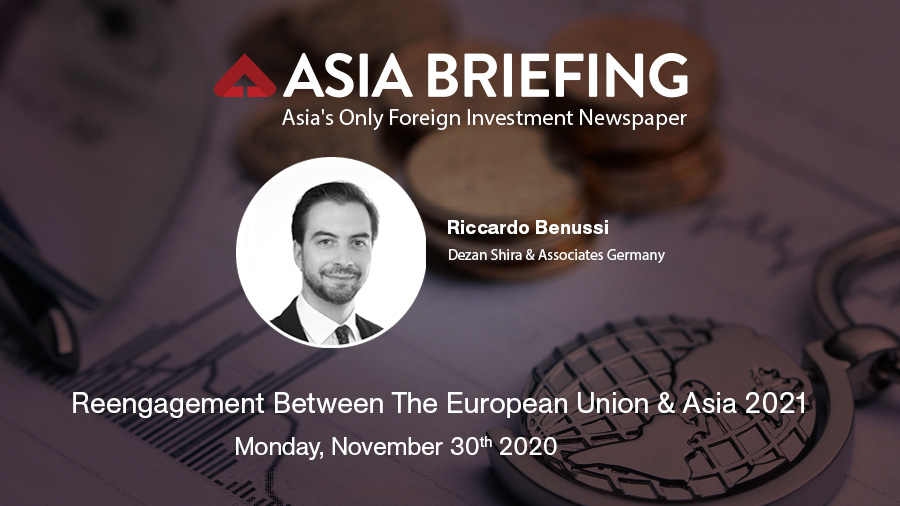Monday, November 23, 2020

By Riccardo Benussi, Dezan Shira & Associates Germany
Rarely has global contemporary history recorded a simultaneous quake at all levels of society as in 2020. Creeping out of a mid-winter in the heart of China, this virus spread, crossed borders, caught us all off guard and smacked us in its unique but universal language, one of impending peril to life. No one excluded. Confusion swept across media which called struggling governments to swift action. The world experienced the effects of chokes in supplies and any decision-maker tried to quickly base their next few choices on instinct, science, or experience in their overnight measures or policies to salvage themselves, the ill, protect citizens, safeguard employees, secure cargo, reassure customers. Next, commercial effects were immediately to be seen and contracts had to be revised, deals were lost, force majeure clauses were invoked, damages demanded, supply chains shaken and deeply reformed. A real pandemic (pan = everything; demos = population), no place to hide.
In turns, the world started entering times of recovery and redesigning strategies while taking care of its wounds. Like never before, foreign SMEs abroad and especially in China and Asia at large, started sharing experiences, best practices, working together, and the institutions were chiming in and a strong sense of broad cooperation permeated the global discourse amongst European business leaders. Eventually, now that in Europe we are still dealing with the perils of the second wave but are enjoying relative headspace to peek into the next couple of years ahead, most European businesses in Asia look at next year with relative confidence while taking some caution in where placing their next batch of eggs.
Regardless the virus, business has reaffirmed its ability to not only overcome but also exploit a pandemic: partnerships among country blocks are being signed as the RCEP (some call it a de-potentiated TPP), treaties have come in power such as the Europe Vietnam Free Trade Agreement, APEC Malaysia just concluded, and more.
While most of the non-Asian and Australasian regions are dealing with sharp rises of Covid cases and the difficulty of its handling, and the US presidential change of guards is underway, which keeps the loudest media occupied, China seems to enjoy a relatively fortunate period for unobstructed visibility. As if almost completely healed from a deadly virus, and scarred from a reckless trade war, China has the opportunity to speak from several podiums during this year full of international treaties and partnerships, but also has the chance to set a tone in international development and coordination on an array of topics.
Along with this comes the strength of ASEAN which European politics and businesses can no longer ignore or dismiss as a bundle of low-tech economies and unreliable governments. In fact ASEAN, with all of its dizzying diversity, huge population, friendlier economies and with a reinvigorated identity, shall be high on the agenda of any European SME and government.
Chinese leadership and other Asian nations now have an opportunity, wider than before, to redefine globalization and its underlying ideology traditionally marked by economic disparity. For China and the rest of the world it seems inevitable today more than ever that the ambition of being
able to harness the decoupling of two worlds will not be satisfied by only dusting the fact that there was an ancient friendship already in place, but by knowing how to value its industrial prowess and contributions to overall global development.
The European and Asian table of diplomacy and international politics is quickly restoring its pace and looks East for reassurance, business continuity and more than ever know that the Asian region – a megaregion stretching from the Red Sea to Japan – is most definitely going to remain the place to invest, sell, develop and expand. And my reasoning is based on my conviction that Asians and Asian nations are more comfortable with a leadership of many than a single and polarized beating of the drum, as the US for example, similarly to the European Union’s philosophy. European businesses are faster than their politics, but come a radical political choice, they too suffer from their decisions.
Italy, a long-term commercial partner of China is celebrating 50 years of its diplomatic relationships with China. Germany, a quiet giant in the trade with Asia is entering its last year with Chancellor Merkel in power, a leader that rarely engaged adversely with its counterparts in Beijing. Ambivalent France is still an overall engaged economy with China and Asia, and aside from the recurring outbursts on rights, 5G, the South China Sea and the bickering on bullish investment agreements (rather than trade), the European countries at large seem to welcome the proactive leadership of China and its Asian partners as a whole. Afterall, after so many failures in the history of international politics and trade, might just prove again that it is more effective to embrace (or continue to embrace) a ‘change through trade’ approach with a country whose economy benefits all, even if not all values are shared. If we really want to see a positive influx of positive values amongst economies and its leaders, keeping trade open can only benefit and truly harmonize the world to come.
With kind regards;
Riccardo Benussi
Dezan Shira & Associates
Germany Office
riccardo.benusi@dezshira.com
www.dezshira.com
Disclaimer
Any views or opinions represented in this blog are personal commentary, belong solely to the contributor and do not necessarily represent the views of Asia Briefing Limited or Dezan Shira & Associates.


